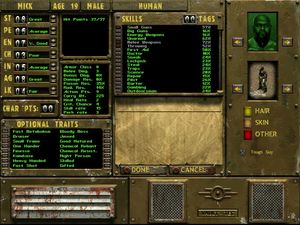Still working to recover. Please don't edit quite yet.
SPECIAL (role-playing system)
| This article contains content from Wikipedia An article on this subject has been nominated for deletion on Wikipedia: Wikipedia:Articles for deletion/ SPECIAL (role-playing system) Current versions of the GNU FDL article on WP may contain information useful to the improvement of this article |
WP+ NO DEL |
SPECIAL is a character creation and statistics system developed specifically for the Fallout franchise of role-playing video games. SPECIAL is an acronym, representing the seven attributes used to define Fallout characters: Strength, Perception, Endurance, Charisma, Intelligence, Agility and Luck.
SPECIAL is heavily based on GURPS, which was originally intended to be the character system used in the game.
Design[edit]
The SPECIAL system involves the following sets of key features:
- Attributes (listed above) represent a character's core, inborn abilities. Attributes stay largely constant throughout the game, though they can be temporarily affected by drugs, altered indefinitely by conditions such as the wearing of Power Armor, the presence of certain NPCs or eye damage received in a critical hit, or permanently changed at certain points in the game, through use of certain items.
- Skills represent a character's chance of successfully performing a group of specific tasks (such as firing a gun, or picking a lock). They are represented as percentages, though these percentages can extend well beyond the expected maximum of 100%, at increased cost for skills over 100%. The SPECIAL stats continually add bonuses to skills. This is done passively, i.e. if the SPECIAL stats change, the bonuses are automatically and instantly adjusted. Skill Points that are earned each time the character levels up can be used to raise skill percentage. At character creation, the player also selects three Tag Skills — Skills which can be increased at multiples of the normal rate, starting at one skill point per 2% skill at under 101% skill.
The SPECIAL system has thus far been used in the role-playing video game Fallout, Fallout 2 and Fallout Tactics: Brotherhood of Steel. A heavily modified version of the system was used for Wikipedia:Fallout 3, Fallout: New Vegas, and Fallout: Warfare, a tabletop battle game available on the Fallout Tactics bonus CD.
Aside from Fallout games, modified versions of SPECIAL were also used in Lionheart: Legacy of the Crusader (also referred to as Fallout Fantasy early in production), a fantasy role-playing video game that involved spirits and magic in addition to the traditional SPECIAL features, as well as the cancelled project Black Isle's Torn.
In the Fallout series[edit]
Character development is divided into four categories: attributes, skills, traits and perks, which has been copied or adapted in some form or another in later iterations of the series.
The protagonist is governed by the system called SPECIAL (an acronym for "Strength, Perception, Endurance, Charisma, Intelligence, Agility and Luck"), designed specifically for Fallout and used in the other games in the series. Strength, Perception, Endurance, Charisma, Intelligence, Agility and Luck are the seven basic attributes of every character in the game.[1] The SPECIAL stats continually add bonuses to skills. This is done 'on the fly', i.e. if the SPECIAL stats change, the bonuses are automatically and instantly adjusted. Some 'perks' and coded events within the game require a certain level of particular SPECIAL stats.
There are 18 different skills in the game, ranging in value from 0 to 200 percent. The starting values for Level 1 skills are determined by the player's seven basic attributes, and initially fall within the range of 0 to 50 percent. Every time the player gains a level, skill points are awarded that can be used to improve the character's skills. The player may choose to tag three skills that will improve at twice the normal rate and receive a bonus at the start. Skills are divided into three categories: combat, active and passive. Books, although scarce in the early game, can be found throughout the game world, and permanently improve a specific skill when read. However, after a skill reaches a certain level, books no longer have an impact. Some NPCs can also improve skills via training. Some skills are also improved by having certain items equipped. For instance, a lockpick improves lock-picking skills. Stimulants can also temporarily boost a player's skills, however, they often have adverse effects such as addiction and withdrawal.
Traits are special character qualities which can have significant effects on gameplay. At character creation, the player may choose up to two traits. Traits typically carry benefits coupled with detrimental effects.[1] For example, the trait "Small Frame" improves agility by one point, but negatively affects maximum carrying capacity. Once a trait is chosen, it is impossible to change, except by using the "Mutate" perk which allows a player to change one trait, one time.
Perks are a special element of the level up system. Every three levels (or every four if the player chooses the "Skilled" trait), the player is presented with a list of perks and can choose one to improve their character. Perks grant special effects, most of which are not obtainable via the normal level up system. These include letting the player perform more actions per round, or being able to heal wounds faster. Unlike traits, perks are purely beneficial; they are offset only by the infrequency with which they are acquired.
The more roleplaying version of the series also track the moral quality of the player character's actions using a statistic called Karma, as well as a series of reputations. Karma points are awarded for doing good deeds, and are subtracted for doing evil deeds. The effect of this statistic during the course of the game is minimal; however, the player character may receive one of a number of "reputations", that act like perks, for meeting a certain threshold of such actions, or for engaging in an action that is seen as singularly and morally reprehensible.
See also[edit]
External links[edit]
- SPECIAL article at The Vault, the Fallout wiki
